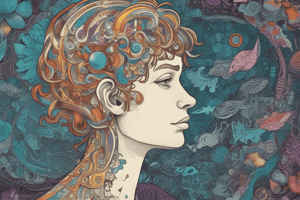Podcast
Questions and Answers
What is a common characteristic of anxiety disorders?
What is a common characteristic of anxiety disorders?
- Lack of emotional responses
- Increased depression
- Exclusive to childhood
- Inappropriate expression of fear (correct)
Which symptom is NOT typically associated with PTSD?
Which symptom is NOT typically associated with PTSD?
- Increased anxiety
- Emotional numbness
- Flashbacks
- Euphoria (correct)
What plays a significant role in the biological basis of anxiety disorders?
What plays a significant role in the biological basis of anxiety disorders?
- Hippocampus regulation of dopamine
- Cerebellum imbalance
- Inhibition of endorphins
- HPA axis activation (correct)
What is the primary function of compulsions in obsessive-compulsive disorder (OCD)?
What is the primary function of compulsions in obsessive-compulsive disorder (OCD)?
Which structure is involved in activating the HPA axis during stress responses?
Which structure is involved in activating the HPA axis during stress responses?
Which branch of medicine focuses on disorders that affect the mind or psyche?
Which branch of medicine focuses on disorders that affect the mind or psyche?
What are the three major types of psychiatric illnesses mentioned?
What are the three major types of psychiatric illnesses mentioned?
What is the correct interpretation of mental illness in contemporary understanding?
What is the correct interpretation of mental illness in contemporary understanding?
Which of the following best describes the term 'mental illness'?
Which of the following best describes the term 'mental illness'?
Which of the following factors are considered mutually interacting in the product of brain activity?
Which of the following factors are considered mutually interacting in the product of brain activity?
What does neurology primarily deal with?
What does neurology primarily deal with?
Which concept does NOT align with the current understanding of mental illness?
Which concept does NOT align with the current understanding of mental illness?
Which of the following correctly categorizes a neurological disorder?
Which of the following correctly categorizes a neurological disorder?
What was Freud's view of the cause of mental illness?
What was Freud's view of the cause of mental illness?
Which disorder was historically referred to as general paresis of the insane?
Which disorder was historically referred to as general paresis of the insane?
According to psychosocial approaches, how are maladaptive responses to the environment treated?
According to psychosocial approaches, how are maladaptive responses to the environment treated?
What are some biological causes of mental illnesses mentioned?
What are some biological causes of mental illnesses mentioned?
What is the primary advantage of electroconvulsive therapy (ECT)?
What is the primary advantage of electroconvulsive therapy (ECT)?
What is a significant challenge for molecular medicine in psychiatry?
What is a significant challenge for molecular medicine in psychiatry?
What is the primary focus of current drug research related to schizophrenia?
What is the primary focus of current drug research related to schizophrenia?
Which treatment is primarily associated with stabilizing mood for bipolar disorder despite an unknown mechanism?
Which treatment is primarily associated with stabilizing mood for bipolar disorder despite an unknown mechanism?
What therapeutic approach does psychotherapy primarily rely on?
What therapeutic approach does psychotherapy primarily rely on?
Which class of drugs is known to primarily reduce positive symptoms of schizophrenia?
Which class of drugs is known to primarily reduce positive symptoms of schizophrenia?
How did Paul Ehrlich contribute to mental health treatment?
How did Paul Ehrlich contribute to mental health treatment?
What approach is used in deep brain stimulation for severe depression?
What approach is used in deep brain stimulation for severe depression?
What is described as an innate response to threatening situations?
What is described as an innate response to threatening situations?
What is a common physical change associated with schizophrenia?
What is a common physical change associated with schizophrenia?
What is one of the significant side effects of using conventional neuroleptics?
What is one of the significant side effects of using conventional neuroleptics?
Which of the following best describes the positive symptoms of schizophrenia?
Which of the following best describes the positive symptoms of schizophrenia?
What hypothesis is suggested regarding NMDA receptors in the context of schizophrenia?
What hypothesis is suggested regarding NMDA receptors in the context of schizophrenia?
What characterizes the dopamine hypothesis in the context of schizophrenia?
What characterizes the dopamine hypothesis in the context of schizophrenia?
Which statement regarding the understanding of mental illness is true according to neuroscience's impact on psychiatry?
Which statement regarding the understanding of mental illness is true according to neuroscience's impact on psychiatry?
Which treatment method is mentioned as being effective for mild to moderate depression?
Which treatment method is mentioned as being effective for mild to moderate depression?
What is a known adverse effect of electroconvulsive therapy (ECT)?
What is a known adverse effect of electroconvulsive therapy (ECT)?
Which medications are classified as antidepressants?
Which medications are classified as antidepressants?
What is primarily responsible for the vulnerability to environmental factors in schizophrenia?
What is primarily responsible for the vulnerability to environmental factors in schizophrenia?
Flashcards are hidden until you start studying
Study Notes
Neurology vs. Psychiatry
- Neurology is the study of the nervous system and its disorders.
- Psychiatry is the study of mental disorders and their treatments.
- Both neurological and psychiatric disorders can be caused by physiological processes.
Mental Illness & The Brain
- Human behavior is the result of brain activity.
- Brain function is influenced by both heredity and environment.
- Mental illness is a diagnosable disorder affecting thought, mood, or behavior that causes distress or impaired functioning.
- Modern understanding of mental illness recognizes both biological and psychological contributions.
Psychosocial Approaches to Mental Illness
- Freud's theory suggests mental illness arises from conflict between unconscious and conscious elements of the psyche, treated by revealing hidden secrets of the unconscious.
- Skinner's theory posits many behaviors are learned maladaptive responses to the environment, treated by "unlearning" through behavior modification.
- Psychosocial approaches have sound neurobiological bases.
Biological Approaches to Mental Illness
- General paresis of the insane, once a major disorder, was caused by syphilis infection and treated with penicillin.
- Other mental illnesses have been traced to biological causes, such as vitamin deficiency, HIV in the brain, and autoimmune responses.
- Molecular medicine in psychiatry uses genetic information to develop treatments, study pathophysiology, and target drug therapies.
Anxiety Disorders
- Fear is an adaptive response to threatening situations, some innate and some learned.
- Anxiety disorders are caused by inappropriate expression of fear.
- Most common of psychiatric disorders.
Disorders Characterized by Increased Anxiety
- Post-traumatic stress disorder (PTSD) symptoms include increased anxiety, intrusive memories, irritability, and emotional numbness.
- Obsessive-compulsive disorder (OCD) involves obsessions (recurrent thoughts, images, or impulses) and compulsions (repetitive behaviors to reduce anxiety).
Biological Basis of Anxiety Disorders
- Genetic predisposition contributes to many anxiety disorders.
- Fear is evoked by a threatening stimulus (stressor) and manifested by the stress response.
- Experience strengthens or weakens the stimulus-response relationship.
- The hypothalamic-pituitary-adrenal (HPA) axis is involved in the stress response, releasing hormones like CRH, ACTH, and cortisol.
Regulation of the HPA Axis
- The amygdala and hippocampus regulate CRH neurons.
- The amygdala activates the HPA axis through projections to the bed nucleus of the stria terminalis.
- The hippocampus deactivates the HPA axis.
- Dysfunction in the anterior cingulate cortex is associated with affective disorders.
Treatments for Affective Disorders
- Electroconvulsive therapy (ECT) is used for severe depression, involving localized electrical stimulation of the temporal lobe.
- Psychotherapy helps patients overcome negative views and is effective for mild to moderate depression.
- Antidepressants, including MAO inhibitors, tricyclics, and SSRIs, are used to treat depression.
- Lithium is used for bipolar disorder, stabilizing mood but with an unknown mechanism.
- Deep brain stimulation, implanted electrodes in the anterior cingulate cortex, is used for severe depression unresponsive to other treatments.
Schizophrenia
- Schizophrenia is a severe mental disorder characterized by a loss of contact with reality.
- Positive symptoms include delusions, hallucinations, disorganized speech, and abnormal behavior.
- Negative symptoms include reduced emotion, poverty of speech, and difficulty initiating goal-directed behavior.
Biological Basis of Schizophrenia
- Schizophrenia is primarily a genetic disorder, with faulty genes increasing vulnerability to environmental factors.
- Physical changes in the brain, such as larger ventricle-to-brain size ratios, are observed.
- The dopamine hypothesis suggests psychotic episodes are triggered by dopamine receptor activation.
- Neuroleptic drugs block dopamine receptors and reduce positive schizophrenic symptoms.
The Glutamate Hypothesis
- PCP and ketamine, while not affecting dopaminergic transmission, affect glutamate synapses.
- Inhibition of NMDA receptors suggests schizophrenia may reflect diminished NMDA receptor activation in the brain.
Treatments for Schizophrenia
- Treatments involve drug therapy combined with psychosocial support.
- Conventional neuroleptics, such as chlorpromazine and haloperidol, act at D2 receptors.
- Side effects of these drugs include Parkinson's-like symptoms and tardive dyskinesia.
- Current research focuses on the NMDA receptor.
Summary
- Neuroscience advancements have shed light on mental illness as pathologic brain modifications.
- Genes, environment, and synaptic transmission are crucial factors, but the full causes remain unclear.
- Therapeutic drug effects often take weeks to manifest due to complex interactions.
- How psychosocial treatments act on the brain is still being investigated.
- Areas of focus for exam preparation include brain regions/circuits, neurochemicals, and the effects of brain damage.
Studying That Suits You
Use AI to generate personalized quizzes and flashcards to suit your learning preferences.





